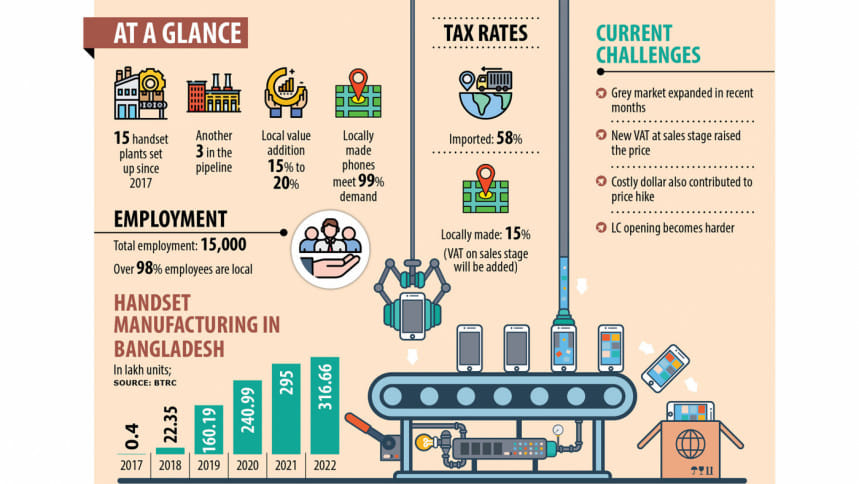Bangladesh made over 10cr handsets so far

Bangladesh's mobile manufacturing industry hit a major milestone of having produced over 10 crore handsets till date, with the local plants gaining the capability of meeting almost all of the annual demand for devices in a span of just over 5 years.
In the latter half of 2017, when Bangladesh allowed local manufacturing by offering a huge amount of tax benefits, only 40,000 cell phones were produced by local firm Walton.
But things started to accelerate the following year as the local entities engaged in deals with top global brands, including Samsung, Tecno and Symphony, to set up manufacturing facilities in Bangladesh.
A total of 15 plants have so far been established in Bangladesh, producing 10.35 crore handsets as of 2022, according to Bangladesh Telecommunication Regulatory Commission (BTRC), which provides manufacturing permits.
In 2018, a total of 22 lakh phones were manufactured, but the number shot up by over sevenfold to 1.6 crore in 2019 with the local production of Oppo, Realme and Vivo-branded devices.
Another 2.40 crore were made in 2020 and despite the acute global supply chain disruptions to the smart device component market due to Covid-19, 2.95 crore were produced in 2021.
In 2022, 3.16 crore handsets were produced locally, which is 99 per cent of the local demand met by official channels -- local production and imports.
By this time, Xiaomi entered into local manufacturing alongside consumer goods giant Pran-RFL Group.
Of the 10.35 crore phones, 67 per cent or 6.94 crore were feature phones while the rest smartphones -- 21.81 lakh 3G phones, 3.16 crore 4G phones and 3.5 lakh 5G phones.
"It's big news for Bangladesh. I couldn't be happier with the way local handset manufacturing industry is advancing," Telecom Minister Mustafa Jabbar told The Daily Star.
"In 2017, when I was the president of the Bangladesh Association of Software and Information Services, we went to the late finance minister AMA Muhith with a proposal to increase duties on imported handsets and decrease duties for locally-made ones," he said.
"He (Muhith) accepted it and directed the National Board of Revenue (NBR) to take the necessary steps," said Jabbar.
"Within just a few years, we can now meet 100 per cent of demand with locally manufactured handsets. But, the significance of that decision will be felt a few years later when it will be a big export product," he added.
"We have set up plants, invested heavily, fully stopped importing and built labs—all that the government wanted," Mohammad Mesbah Uddin, chief marketing officer of Fair Electronics, Samsung's local assembly partner, told The Daily Star.
"Now, the government needs to come forward to help for further expansion," he added.
Currently, a tax of over 60 per cent of the price is imposed on smartphone imports, whereas the tax on locally assembled and manufactured handsets is about 20 per cent to 25 per cent.
The 15 entities invested an estimated Tk 2,000 crore for setting up plants, creating jobs for around 15,000 to 18,000 people.
"We have progressed way more than expectations," said Rizwanul Haque, vice president of the Mobile Phone Industry Owners' Association of Bangladesh.
"Now annual turnover has reached about Tk 15,000 crore. Earlier, full finish products used to get imported. Now there is a value edition," he said.
According to industry people, value addition now stands at up to 20 per cent, with printed circuit boards being made and components being added to those locally.
"We are now ready as we have invested to increase our capacity in the last five years. Now we should grab the export market," said Haque.
"Now we need to get proper government support to expand the backward linkage industry to increase our value addition to 30 per cent producing battery, charger and box," he added.
Many youths in Bangladesh have gained employment in the plants as assembly line managers, unit managers, material management executives and quality control managers on attaining their diplomas in electronics from polytechnic institutes.
Some even got jobs after passing just their HSC exams.
The industry has been contributing to the country's economy creating employment and drawing investment, which is a big achievement, said Shyam Sunder Sikder, chairman of the BTRC.
If the NBR extends some opportunities, the local manufacturers will be able to export Bangladesh-made phones to the global market, he said.
However, the industry has been hit hard by increasing inflation, an unprecedented dollar price hike and an increase in value added tax as their sales have plummeted amid belt-tightening by consumers.
This is compelling the manufacturers to cut production. The smartphone segment is particularly finding itself worse off in the current downturn.
A recent surge of the grey market in Bangladesh has now become a big headache for the local manufacturers.
"We have informed the authority concerned of the government to stop the inflow of phones that has been smuggled into the country. If this is not stopped immediately, the industry will face a severe backlash," added Telecom Minister Jabbar.

 For all latest news, follow The Daily Star's Google News channel.
For all latest news, follow The Daily Star's Google News channel. 



Comments